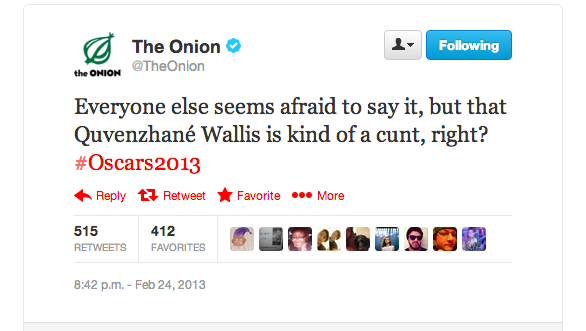I extend the same theory to comedy in general. The Onion's Oscar Night tweet wasn't a "bad" joke. It wasn't funny. Period. Attacking the site, especially after they offered an apology, misses the entire point of comedy. Calling 9 year old Oscar nominee Quvenzhané Wallis the c-word wasn't funny. We've registered that fact, the Onion owned up to it, let's move on.
In case you've had your head buried in the sand like I usually do, here's the gist of it. On Sunday night, the Onion published this tweet:

People lost their minds because the website called a little girl the c-word. The tweet was deleted within a few hours (but thankfully preserved via the internet). On Monday, Steve Hannah, the CEO of The Onion, issued the following apology.
Dear Readers,The mantra that keeps getting repeated is that this is a rare apology from The Onion. No one seems to be citing other controversies in which The Onion refused to back down. The closest I could find is this index of stories over at the Huffington Post. Along with Onion staffers past and present, I guess I'm firmly in the camp against the apology. Even some members over at the staff at Forbes are against it.
On behalf of The Onion, I offer my personal apology to Quvenzhané Wallis and the Academy of Motion Picture Arts and Sciences for the tweet that was circulated last night during the Oscars. It was crude and offensive—not to mention inconsistent with The Onion’s commitment to parody and satire, however biting.
No person should be subjected to such a senseless, humorless comment masquerading as satire.
The tweet was taken down within an hour of publication. We have instituted new and tighter Twitter procedures to ensure that this kind of mistake does not occur again.
In addition, we are taking immediate steps to discipline those individuals responsible.
Miss Wallis, you are young and talented and deserve better. All of us at The Onion are deeply sorry.
Sincerely,
Steve Hannah
CEO
The Onion
I mostly agree with Movie Bob over at The Escapist. His analysis of the work it takes to craft a funny joke and the laziness of the instant age through so-called live snarking are spot on. I also think he does a pretty good job trying to break down what the joke was trying to do; i.e. to satirize the constant roll of comments about Hollywood, much of it nasty, and much of the nastiest of the nasty aimed at women.
I'm going to leave aside free speech and disciplining employees for work clearly within the parameters of the company's work. Instead, I want to look at the joke a little closer. Where I think Bob goes off-track is in concluding that "that joke wasn't worth telling in the first place." He overlooks a couple of key points.
First, those familiar with the Onion would immediately recognize the tweet for what it was: a joke. It was never intended to be an attack on Quvenzhané Wallis. In fact, they targeted her exactly because she wasn't supposed to be the target of an attack. She's a child and bloggers usually lay off the vitrol when it comes to children. Tweeting about her focused the satirical edge. It had to be her because saying something nasty about any other (adult) actress would simply look like all the other nastiness.
Second, part of the problem is that of audience. When you pay your money and take a seat at a comedy club, you (are supposed to) know what you're signing up for. There's a selection bias at work. Unfortunately for the Onion, twitter doesn't work with that same selection bias. Anybody reading the Oscar tweets would have been able to pick up their comment, even those unfamiliar with or not amused by the Onion. Satire, especially the hard edged kind the Onion is known for, isn't everybody's cup of tea. The internet and especially twitter spread offense at the speed of retweet.
Third, the context is pretty clear when you read the whole tweet. Summaries like "the Onion basically called Wallis the c-word" miss the context clues that should let you know this is satire. The "[e]veryone else seems afraid to say it" and the form of a question ending with "right?" indicate this isn't meant to be taken seriously. It isn't a declaration, it's a question in the familiar "amirite" form. And the fact that "everyone is afraid to say it" brackets off the conclusion. They don't say it not because they afraid to say it but because it's a wrong thing to say. The point was to transgress those boundaries to comment about the daily transgression of those boundaries by Perez Hilton, TMZ, and others. The tweet as a whole disavows the very conclusion that people made and shared about it.
All of this to say that I didn't think the joke was all that funny. I get what the writer over at the Onion was trying to do. Maybe 140 characters isn't enough to properly establish satire in. Maybe I would have found it funnier if I had been following their entire series of tweets about the Oscars so that I was prepared for a joke-mean on its surface-about a 9 year old. Or maybe I just don't think 9 year olds should be the target of such jokes even when they're not really the targets. Maybe we should leave the kids out of the politics. Even those kids who walk down the target range that has become the Red Carpet.
The difference between my view and Bob's is perhaps subtle but important. He thinks the joke wasn't worth telling. I think it was worth telling, it just wasn't funny. And maybe there's a place in this world, a critical place, for unfunny jokes. [roll out tired bit for cheap laughs] Except for Dane Cook. That guy sucks.